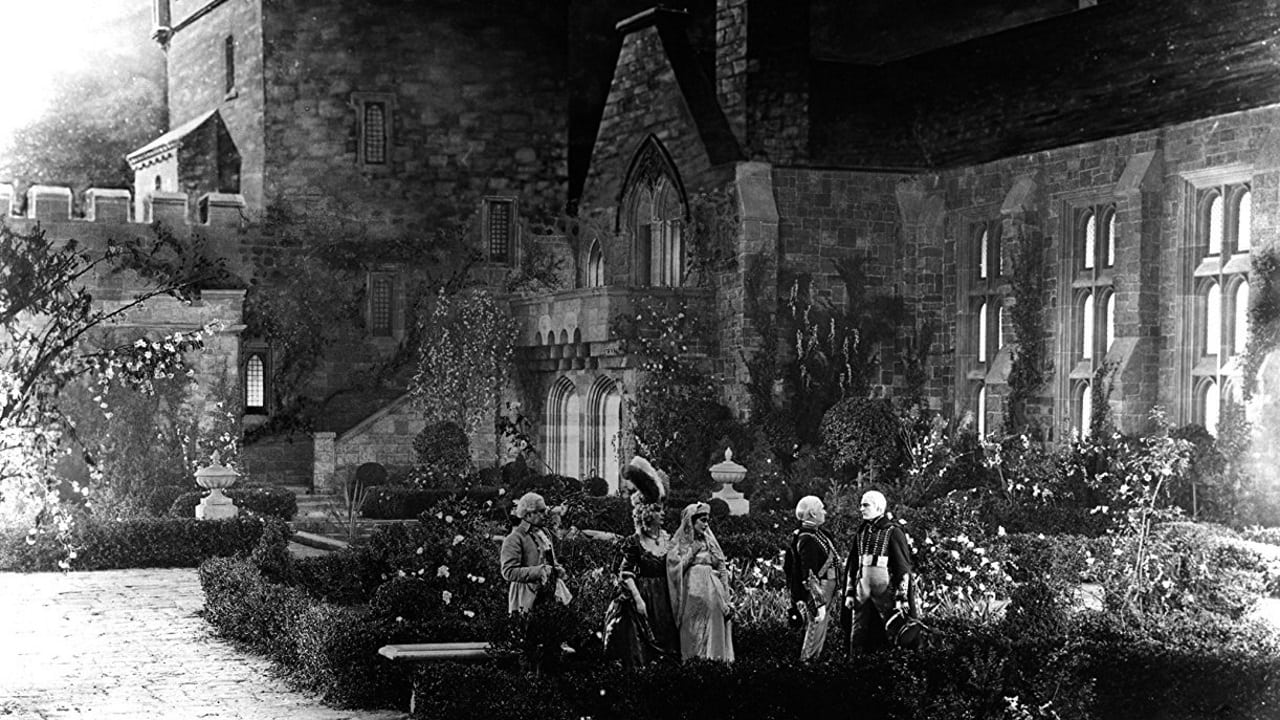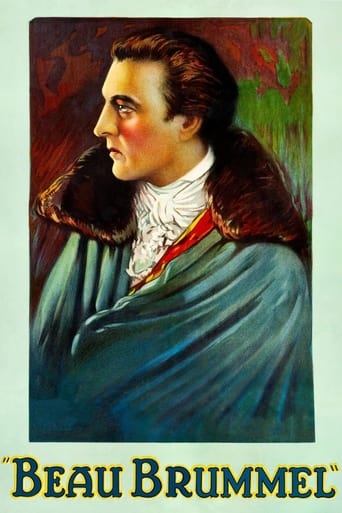

Director: HARRY BEAUMONT. Screenplay: Dorothy Farnum. Based the 1916 play by Clyde Fitch. Photography: David Abel. Film editor: Howard Bretherton. Art directors: Esdras Hartley, Lewis Geib. Assistant director: Frank Strayer. Art titles: V. Vance. Copyright 14 March 1924 by Warner Brothers. New York opening at the Strand: 30 March 1924. 10 reels. 9,900 feet. 128 minutes. COMMENT: This is actually Willard Louis' film. He plays the Prince of Wales with total finesse, whereas Barrymore is forced to play most of his role in whiteface, which doesn't really suit him, despite director Harry Beaumont's willingness to indulge him with countless shots of his "great profile". It's not until the end of the movie that Barrymore gets a chance to really show off his acting skills, whereas Willard Louis plays his princely caricature as if to the manner born. And it's good to see super-lovely Mary Astor who makes both a charming and believable heroine here. The movie is fortunately available on a superb 10/10 DVD from Warner Archive, as well as a totally unwatchable Televista pressing. A pity all Warner Archive offerings don't always come up to this same impeccable standard. Across to Singapore (1928), for example, would rate only 6/10 in my book due to extensive nitrate decomposition.
... View MoreFor 1924, this is a truly exquisite looking film. You can tell that the fledgling studio, Warner, really pulled out all the stops to make this film a success--great sets, camera-work and even recruiting John Barrymore back from the stage to star in this film. However, despite all these positives, the overall effect isn't all that engaging--thanks to a very weak story that practically put me to sleep.The problem with the story is that Beau Brummel is a very, very flawed man. At first, you see him as flawed but decent. Later in the film, he just seems like a jerk--allowing his way overblown ego to ultimately destroy him. In fact, this made the second half of the film much tougher going because it was hard to care about a man who simply didn't deserve it. Plus, so much of the film consisted of rather syrupy love scenes and Barrymore's acting was really over the top. While I love many of Barrymore's films, in this one he seemed a bit "hammy"--nothing like his later film roles.Without a serious re-working of the film, this one turned out to be very pretty but ultimately as dull as the later Stewart Granger re-make. Pretty to look at but not very satisfying--it's like eating a meal entirely of unflavored rice cakes.
... View MoreIn presenting the story of Beau Brummel, Warner Brothers did an infinitely better job than MGM in the Fifties in that film that starred Stewart Granger, Elizabeth Taylor and Peter Ustinov. Though this is a silent film and sadly silent because we don't get the benefit of John Barrymore's magnificent speaking voice, still the essence of Brummel as a Regency social climber comes through.That was the problem with the Granger/Taylor version. It presented a Brummel who tried to interfere in the political issues of the day. The real Beau could have cared less for what was going on in Parliament with Pitt and Fox going at each other. That's the Beau that Barrymore gives us in this version.Barrymore also succeeds in making Beau a more real person. This is a very hard character to bring to life because Brummel didn't really accomplish anything. He was a soldier who resigned his commission in the army to pal around with the Prince Regent. He didn't stand for anything, create anything, espouse a popular cause. He got involved in a couple of Regency Scandals and eventually the Prince of Wales got bored with him. We don't like the Brummel that Barrymore creates, but we do get some insights into a man who did let some real chances in life slip by.Mary Astor and Irene Rich and Carmel Myers play a trio of the women in his life. Willard Louis perfectly recreates my own conception of what the weight challenged Prince of Wales who later become George IV was like. Not easy to do because even in the Granger/Taylor version of the story, Peter Ustinov easily walked off with acting honors. There's also a nice performance by Alec Francis as Barrymore's devoted valet.The end of the film with the dying Brummel going through dementia is silent screen acting at its finest and some of the best work I've seen John Barrymore do. Try to catch this film when broadcast next.
... View MoreClyde Fitch's play, written for renowned stage actor Richard Mansfield, is a very romantic interpretation of incidents in the life of George (Beau) Brummel, the Regency dandy whose name has become a watchword for sartorial splendour and correctness, and is itself freely adapted for this film that showcases the unparallelled talent of John Barrymore in his prime as Brummel. With revenge in his heart, Brummel sets out to manipulate London society in a great game due to his, because of an untitled station, having lost his lover, played well by 18 year old Mary Astor with whom Barrymore began an affair during this filming, and he utilizes a close relationship with his sponsor, the Prince of Wales, the Regent (later King George IV), to advance his plan. Barrymore's control of his scenes is unmatched as he expresses the widest possible range of emotion and reaction with the smallest movement of eyes or mouth and, although there are opportunities aplenty for emoting, his utilization of a prolonged gaze into the eyes of a lover or foe speaks volumes. Barrymore is strongly assisted by a very able supporting cast, including Willard Louis as the Prince of Wales, Aleck B. Francis as Brummel's loyal manservant and, as the Duchess of York, the exquisite Irene Rich, whose rhythms and ability to focus upon her character's persona nicely complements Barrymore during their shared scenes. Harry Beaumont, as always, directs capably and is assisted enormously with his efforts by cinematographer David Abel, whose skill with large groups during complicated action was later markedly in evidence as he supervised the cameras during the best of the Astaire/Rogers films. Somewhat more than a cavil might be a desire for the scenario to have presented more of Brummel's full life rather than the lengthy treatment given to its denouement, and that lacking in accuracy, but certainly allowing Barrymore a good deal of dramatic opportunity that does not go shunned.
... View More